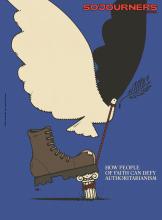
Illustrations by Sam Lubicz
The Ministry of Dungeons and Dragons
“ONE OF THE TRADITIONS of St. Patrick is an old prayer that he wrote called ‘St. Patrick’s Breastplate,’” explained Father David Rose of St. Luke’s Episcopal Church in Rincon, Ga., to the half-dozen men who’d gathered around him. “It’s more like an epic poem, like an old epic Celtic poem, but it’s a prayer.”
“I bind unto myself today / the strong Name of the Trinity,” he continued, reciting stanzas of the 1,500-year-old prayer. “By invocation of the same / The Three in One and One in Three / Of Whom all nature hath creation / Eternal Father, Spirit, Word: Praise to the Lord of my salvation / Salvation is of Christ the Lord!”
Father Rose wasn’t addressing his fellows from the pulpit, however, nor were they gathered in the basement or rectory of St. Luke’s. Instead, he was speaking to a group of Dungeons & Dragons players at Savannah Lion Games in Pooler, Ga., at a table covered in rulebooks and dice rather than Bibles and hymnals.
Welcome to Game Church.
‘Fresh Expressions’ of faith
GAME CHURCH IS the brainchild of Rose and two United Methodist ministers: Pastor Matt Stout of Garden City UMC in Garden City, Ga., and Pastor Matt Waldron of St. Luke UMC in Savannah, Ga. Prior to collaborating on the project, the trio had known each other for years as colleagues and eventually friends, and Rose and Stout were avid gamers, having picked up D&D in the late 2010s. But the notion that such a game could be used as a pathway toward discussions of Christ outside of the walls of the church had never occurred to them.
That was until June 2023 when Waldron attended a meeting of the South Georgia Conference of the UMC and learned about “Fresh Expressions,” a program to “cultivate communities of love and grace for people neglected by the church,” according to the UMC website. “Fresh Expressions is very much rooted in doing new things with new people in new ways,” said Anne Bosarge, director of leadership strategies and local church resources for the conference. “It is realizing that the traditional and typical method of doing church, with a set building at a set time at a set place, with a particular order of worship, isn’t going to meet the needs of every single person,” Bosarge told Sojourners. Waldron was inspired by the program’s potential to reach folks who wouldn’t otherwise engage with the church, and he immediately thought of Stout and Rose and how they could potentially use tabletop role-playing games as a platform for discussing matters of faith. Not long after, the trio began discussing how Game Church would be formatted and how they could marry gaming and spirituality in a way that would make sense.
“It’s been my experience when people think of an outreach or an evangelistic push that the message goes out in a way that’s coercive or judgmental or manipulative,” Waldron said. “And I’ve really clicked with Fresh Expressions because it isn’t that. ... It’s woven very organically into the group of people you’re interacting with.”
The three selected Stout, the most experienced D&D player among them, as the leader of their events. He had also spent years in the basement of a local hobby shop playing the X-Wing Miniatures Game, where players battle with small Star Wars ships over a handcrafted landscape. Stout asked the owners if they could host Game Church for 3 hours every other week, and six men became regulars.
By August of that year, they’d lined up their first “campaign,” the tabletop gaming term for a series of play sessions that form a cohesive storyline. It included Stout and Rose, as well as a mix of veteran and new players, most of whom weren’t part of any formal church or religious denomination. “People come as they are,” Stout said. “It’s not a very religious-feeling experience. We’re not watching our language. The game plays out the way it’s gonna play out.”
‘I think of a dude named Jesus’
THE PLAYERS WHO show up to Game Church range in age from 18 to over 60, and among its members are a helicopter mechanic, a student, and a temp worker named Jonathan Moore. Moore came aboard for Stout’s second campaign, having seen the metaphorical connections between the self-described “dungeons” he’s traversed in real life and the challenges that his fictional in-game character might choose to face.
“It completely takes me out of my comfort zone, which is exactly what I need and what I’m looking for,” Moore said. “I’m in it because I think of a dude named Jesus, and there’s this thing called death at the end of life. And that MF-er right there, he wrote the whole calendar.”
Moore’s language, eclectic hairstyle, and torn clothes won’t have him selling Bibles door to door anytime soon. But he’s exactly the type that Game Church is designed for. “We want these meetings to be organic and fun,” Stout explained. “One of the verses that we are centering these meetings around is Matthew 11:28: ‘Come to me all you who are weary and heavy laden and I will give you rest.’ We want this to be an oasis in our players’ weeks to have fun and connect with others on a spiritual level.”
To that end, each session begins with a reading, such as Rose’s recitation of “St. Patrick’s Breastplate,” along with an accompanying homily-like discussion of its spiritual importance. Often, these talks integrate things happening in the game itself, as was the case when Rose equated items that are comforting and precious to the characters as being similar to the artifact discussed in the prayer. Then, each person in the group is offered the opportunity to note what’s going on in their lives and to ask for prayers from the others in attendance. Finally, the game begins and plays much like any other session of Dungeons & Dragons.
For Moore, who has explored numerous religious denominations — from Lutheran and Methodist churches to the Church of Jesus Christ of Latter-day Saints — the Game Church formula is giving him something none of those other places ever provided: A sense of belonging. “I was just on Facebook, Savannah Dungeons & Dragons, just looking around for dungeons, and Matt [Stout] reached out to me,” Moore said. “Just before [I joined], he disclosed, ‘Just so you know, this isn’t church, but we’re coming from church to play together.’ And I’m like, ‘That’s absolutely perfect.’ I come to the table, and that’s church.”
Moore continued, “You got all your friends and your characters and stuff; you don’t got your, ‘It is, it was, it always will be’ blue-collar traditional guy out there talking like he’s your daddy. We are so over that, and a lot of people don’t understand where we’re coming from.”
Fellow Game Church player Robert Baron agreed. Previously, he was in a charismatic denomination, but after his longtime pastor died, he found himself moving away from organized religion. Then his friend Stout, with whom he’d bonded over the X-Wing Miniatures Game, invited him to “DM” (act as Dungeon Master, i.e., run the game) for the new endeavor’s first campaign.
“They forget who Jesus talked to,” Baron said of his issues with modern organized religion. “He talked to the beggars. He talked to the whores. The low of the low. These are the people you need to talk to.”
The 52-year-old Army veteran is playing a dwarven battle priest, a gruff fighter who gives tough love but who deeply cares about his fellow humans (and “demi-humans,” as dwarves, elves, and other sentient bipedal creatures are referred to in D&D). In many ways the character is an amplification of the player’s best real-life attributes: A wise leader, an old-timer in spirit who spares no nonsense but hopes to positively impact those with whom he connects through his actions and behavior.
“The way I was taught through church and through the ministry is you just got to be there,” he reflected. “When God opens the door, you got to be ready to step through.”
Read the Full Article

Got something to say about what you're reading? We value your feedback!


